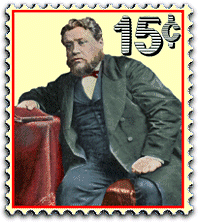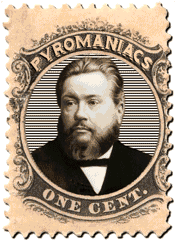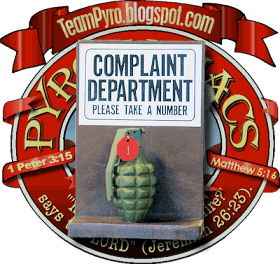- It seems fitting to mark this Reformation Day by quoting the first and third of the ninety-five-shot volley that Martin Luther nailed to the door of the Wittenberg church. Note how timely it is:
- Dr. Martin Luther, the thirty-something monk who shook the pillars of power and changed history by insisting on Scriptural truth in the face of fierce opposition, loved a good joke. I think he might have enjoyed The Reformation Polka. At our house, we do; and we plan to sing it happily (along with A Mighty Fortress Is Our God) at our Reformation celebration tonight.
- To my great delight, my pastor loaned me the pulpit last Sunday. It being the Sunday before Reformation Day, the sermon's focus was Romans 1:17, and it is titled Five "Alone's" that Changed Everything. (Audio difficulties for about the first 23 seconds.)
- Thought: Luther not only was used by God to start the Reformation, but he serves as a good illustration of it. I can't count how many times Romanists have cited this or that goofy,
 offensive, or just downright wrong statement of Luther's, as if my faith will collapse in shards. They just can't fathom my response, which is twofold: (A) That's the thing about Sola Scriptura, isn't it? Unlike Romanists, I am not chained to defend and repeat the mistakes of past erring men. And what's more, (B) think of it: even a goof like Luther could figure out that Scripture teaches salvation as solo Christo, sola gratia, sola fide, soli Deo gloria. What does that say about the learned geniuses of Rome (and elsewhere), who still deny what Scripture affirms?
offensive, or just downright wrong statement of Luther's, as if my faith will collapse in shards. They just can't fathom my response, which is twofold: (A) That's the thing about Sola Scriptura, isn't it? Unlike Romanists, I am not chained to defend and repeat the mistakes of past erring men. And what's more, (B) think of it: even a goof like Luther could figure out that Scripture teaches salvation as solo Christo, sola gratia, sola fide, soli Deo gloria. What does that say about the learned geniuses of Rome (and elsewhere), who still deny what Scripture affirms? - What a point of contrast Luther serves to the namby-pamby lightweights of our day. Clearly Luther did not oppose Rome happily. Clearly he was aware that his life was in danger. Clearly, if another way could have been found that would have preserved his conscience and his church affiliation, he would have taken it. Yet at the real risk of the cost of everything, of "goods and kindred" and "this mortal life," Luther stood forth and declaimed. By stark and shameful contrast, how many of today's "leaders" won't risk -- not even life nor limb, but merely -- their reputations as thoughtful, broad-minded moderates and academics; their connections to the similarly tepid; their Q Score; their associations; in short, their friendship with the world? There were giants in the land, in Luther's day. In our day? Not so much.
- More Luthery goodness in the form of John Piper's talk, Martin Luther: Lessons from His Life and Labor. It is also available in print. Check this quotation from Luther, and say "yowch":
It is a sin and shame not to know our own book or to understand the speech and words of our God; it is a still greater sin and loss that we do not study languages, especially in these days when God is offering and giving us men and books and every facility and inducement to this study, and desires his Bible to be an open book. O how happy the dear fathers would have been if they had our opportunity to study the languages and come thus prepared to the Holy Scriptures! What great toil and effort it cost them to gather up a few crumbs, while we with half the labor— yes, almost without any labor at all—can acquire the whole loaf! O how their effort puts our indolence to shame.
Then there's the very fine talk by Pastor Tom Browning, Reformation Day: October 31, 1517. Browning has other lectures on the Reformers on their times as well. And if you haven't seen the 2003 movie Luther, I recommend it highly. - Read an engagingly-written article by J. D. Wetterling, on the life and impact of Martin Luther. I do have one quibble, however. Wetterling writes that Luther
had been a monk for three or four years when, while reading the first chapter of Romans, he was struck by verse 17: "...as it is written, ‘The just shall live by faith.’" It was as if "…the door of heaven had been thrown open wide."
One could gain from this the impression that Luther read through Romans, saw this verse, the floodlight instantly burst on, and everything changed in an instant. This isn't at all how Luther describes the process. Hear the Reformer himself:I greatly longed to understand Paul’s Epistle to the Romans and nothing stood in the way but that one expression, “the justice of God,” because I took it to mean that justice whereby God is just and deals justly in punishing the unjust. My situation was that, although an impeccable, monk, I stood before God as a sinner troubled in Conscience, and I had no confidence that my merit would assuage him. Therefore I did not love a just and angry God, but rather hated and murmured against him. Yet I clung to the dear Paul and had a great
 yearning to know what he meant.
yearning to know what he meant. Night and day I pondered until I saw the connection between the justice of God and the statement that “the just shall live by his faith.” Then I grasped that the justice of God is that righteousness by which through grace and sheer mercy God justifies us through faith. Thereupon I felt myself to be reborn and to have gone through open doors into paradise. The whole of Scripture took on a new meaning, and whereas before the “justice of God” had filled me with hate, now it became to me inexpressibly sweet in greater love. This passage of Paul became to me a gate to heaven....
If you have a true faith that Christ is your Saviour, then at once you have a gracious God, for faith leads you in and opens up God’s heart and will, that you should see pure grace and overflowing love. This it is to behold God in faith that you should look upon his fatherly, friendly heart, in which there is no anger nor ungraciousness. He who sees God as angry does not see him rightly but looks only on a curtain, as if a dark cloud had been drawn across his face. [Roland Bainton, Here I Stand (Pierce and Smith: 1950), p. 65]
I stress Luther's own stress of the agonizing and protracted process, because it affords some encouragement to those of us for whom the light dawns slowly -- when it dawns at all. The greatest insights are not always gained in an instant, in easy and effortless flashes of insight. Sometimes the process is very much like protracted and difficult labor and childbirth. A child is born, yes; but not without agony and blood.
Read all ninety-five debate points here. Does this give us a clue as to where Luther might be on the "Lordship" question?1. When our Lord and Master, Jesus Christ, said "Repent," He called for the entire life of believers to be one of repentance.
3. Yet its meaning is not restricted to repentance in one's heart; for such repentance is null unless it produces outward signs in various mortifications of the flesh.
Surely, in his own way, Luther was quite the PyroManiac.



 he text ...cuts off all idea of living by mere intellect. Too many say, “I am my own guide! I shall make doctrines for myself and I shall shift them and shape them according to my own devices.” Such a way is death to the spirit. To be abreast of the times is to be an enemy to God! The way of life is to believe what God has taught, especially to believe in Him whom God has set forth to be a Propitiation for sin, for that is making God to be everything and ourselves nothing. Resting on an Infallible Revelation and trusting in an Omnipotent Redeemer, we have rest and peace. But, on the other unsettled principle, we become wandering stars for whom is appointed the blackness of darkness forever. By faith the soul can live—in all other ways we have a name to live and are dead.
he text ...cuts off all idea of living by mere intellect. Too many say, “I am my own guide! I shall make doctrines for myself and I shall shift them and shape them according to my own devices.” Such a way is death to the spirit. To be abreast of the times is to be an enemy to God! The way of life is to believe what God has taught, especially to believe in Him whom God has set forth to be a Propitiation for sin, for that is making God to be everything and ourselves nothing. Resting on an Infallible Revelation and trusting in an Omnipotent Redeemer, we have rest and peace. But, on the other unsettled principle, we become wandering stars for whom is appointed the blackness of darkness forever. By faith the soul can live—in all other ways we have a name to live and are dead.

 here is something so enticing and yet so flimsy in the modern theological school,that I feel constrained to warn you constantly against it.
here is something so enticing and yet so flimsy in the modern theological school,that I feel constrained to warn you constantly against it.
 ... and if nobody does anything about it, Martin Lloyd-Jones is going to win and I'll have to send prizes via air-mail to Martin Downes across the pond, doubling my expenses on this contest.
... and if nobody does anything about it, Martin Lloyd-Jones is going to win and I'll have to send prizes via air-mail to Martin Downes across the pond, doubling my expenses on this contest.
 requirements for being an apostle of Christ today (pp. 21-44). Therefore the gift that Paul ranks as the most important and supreme gift to the church (1 Corinthians 12:28) has ceased, has fulfilled its purpose and been withdrawn. This creates an a priori readiness to accept that other gifts might also be designed for a limited shelf-life, like dissolving sutures—though no single verse may say so in so many words.
requirements for being an apostle of Christ today (pp. 21-44). Therefore the gift that Paul ranks as the most important and supreme gift to the church (1 Corinthians 12:28) has ceased, has fulfilled its purpose and been withdrawn. This creates an a priori readiness to accept that other gifts might also be designed for a limited shelf-life, like dissolving sutures—though no single verse may say so in so many words.
 on't think for a moment that I regard
on't think for a moment that I regard 

 There's an interesting moment in the DGM 2006 National Conference audio. Driscoll set up the analogy in his hour that ministry has two hands—one which is doctrine, and the other which is context. In that, he said that as long as we have everything in the doctrine hand correctly, we have a lot of liberty to manage what's in the context hand. The interesting part was when, later in the Conference, John Piper made the statement that it didn't matter to him what was in the "context" hand as long as the "doctrine" hand was sound—and he made that statement acknowledging that some of "us" (the "TRs", the people who really care whether or not people are going to go to hell if the Gospel doesn't reach them—including those who hear a false Gospel which they mistake for the true Gospel) think that there is a place where the "context" hand corrupts the "doctrine" hand.
There's an interesting moment in the DGM 2006 National Conference audio. Driscoll set up the analogy in his hour that ministry has two hands—one which is doctrine, and the other which is context. In that, he said that as long as we have everything in the doctrine hand correctly, we have a lot of liberty to manage what's in the context hand. The interesting part was when, later in the Conference, John Piper made the statement that it didn't matter to him what was in the "context" hand as long as the "doctrine" hand was sound—and he made that statement acknowledging that some of "us" (the "TRs", the people who really care whether or not people are going to go to hell if the Gospel doesn't reach them—including those who hear a false Gospel which they mistake for the true Gospel) think that there is a place where the "context" hand corrupts the "doctrine" hand. There's no question: the ruse that I can go ahead and, for example, attend strip club performances "for the ministry" is completely transparent. You can't go to a strip club under the auspices of 1 Cor 9 because, frankly, "all" does not mean "all" there, does it?
There's no question: the ruse that I can go ahead and, for example, attend strip club performances "for the ministry" is completely transparent. You can't go to a strip club under the auspices of 1 Cor 9 because, frankly, "all" does not mean "all" there, does it? The radical missionary zeal evident in 1 Cor 9 is not a fashion statement. Paul is not saying at all that when in Rome, he attended orgies—though, of course, he only partook in the gluttony and not the sex. And what is most evident in 1 Cor 9, it seems to me, is by what standard he lived for the sake of other men.
The radical missionary zeal evident in 1 Cor 9 is not a fashion statement. Paul is not saying at all that when in Rome, he attended orgies—though, of course, he only partook in the gluttony and not the sex. And what is most evident in 1 Cor 9, it seems to me, is by what standard he lived for the sake of other men. The other way to read this—which is, I think, how Driscoll wants us to read this—is that Paul is saying to the Corinthians, "dude: you can't look down on me for being a guy who is rough around the edges. I'm a friend of sinners, just like Jesus, and if you can't handle that you're not really into missions." There's no careful way to read this passage that way. 1 Cor 9 is, from start to finish, Paul taking the finger some are pointing at him (cf. 1 Cor 9:8-18 ) and pointing right back by demonstrating he has never taken anything from anyone—even that which is his by right in the ministry by the Law of Moses. If Paul's point through v. 20 is, "I have joyfully suffered for your sake in the Gospel," how can it be that suddenly he is saying, "and I have enjoyed all kinds of privileges and exotic customs for the sake of the Gospel"?
The other way to read this—which is, I think, how Driscoll wants us to read this—is that Paul is saying to the Corinthians, "dude: you can't look down on me for being a guy who is rough around the edges. I'm a friend of sinners, just like Jesus, and if you can't handle that you're not really into missions." There's no careful way to read this passage that way. 1 Cor 9 is, from start to finish, Paul taking the finger some are pointing at him (cf. 1 Cor 9:8-18 ) and pointing right back by demonstrating he has never taken anything from anyone—even that which is his by right in the ministry by the Law of Moses. If Paul's point through v. 20 is, "I have joyfully suffered for your sake in the Gospel," how can it be that suddenly he is saying, "and I have enjoyed all kinds of privileges and exotic customs for the sake of the Gospel"? It's not "emergent" to use potty language: it's indiscriminate. It's immature. And it doesn't in any way reflect the missional servanthood of 1 Cor 9 to be all things in service to men who are weak and dying. If we, as men, are going to love them, we can't love them by being more like them. We have to love them by being more like Christ.
It's not "emergent" to use potty language: it's indiscriminate. It's immature. And it doesn't in any way reflect the missional servanthood of 1 Cor 9 to be all things in service to men who are weak and dying. If we, as men, are going to love them, we can't love them by being more like them. We have to love them by being more like Christ.

 erhaps you are one of those who thinks I have been too hard or too shrill in
erhaps you are one of those who thinks I have been too hard or too shrill in 
 we know these things?
we know these things?  have been as a pastor, had I heard one of those in my charge saying "Well, I believe ___ because our pastor says...." My goal is to hear them say, "The Bible says," and then see that they're able to open the Word themselves.
have been as a pastor, had I heard one of those in my charge saying "Well, I believe ___ because our pastor says...." My goal is to hear them say, "The Bible says," and then see that they're able to open the Word themselves.
 o on Sunday nights after church, Darlene and I like to stop by the Starbucks at Sepulveda and Nordhoff. It's not the finest neighborhood in the Valley, but that's the only Starbucks between church and home that's open so late at night.
o on Sunday nights after church, Darlene and I like to stop by the Starbucks at Sepulveda and Nordhoff. It's not the finest neighborhood in the Valley, but that's the only Starbucks between church and home that's open so late at night. I don't care who you are, that's unsettling. I instantly was overwhelmed with guilt and fear, trying to think what law I might have broken. Then the cop rolled his window down, and it was Pecadillo, frowning and pointing at me angrily. I wasn't sure whether I was supposed to pull over or not. His lights weren't flashing, so I kept going, trying to look nonchalant.
I don't care who you are, that's unsettling. I instantly was overwhelmed with guilt and fear, trying to think what law I might have broken. Then the cop rolled his window down, and it was Pecadillo, frowning and pointing at me angrily. I wasn't sure whether I was supposed to pull over or not. His lights weren't flashing, so I kept going, trying to look nonchalant. For those of you who were worried about it,
For those of you who were worried about it, 
 oseph Parker
oseph Parker Parker insisted that Spurgeon needed to say more: "If thou hast aught against thy brother, go and tell him his fault between thee and thy brother [cf. Matthew 18:15]. But as your health is uncertain, I will so far modify the terms as to go to you at your house at any mutually convenient time. This strikes me as the Christian way—the Lord's own way—why should we invent another?"
Parker insisted that Spurgeon needed to say more: "If thou hast aught against thy brother, go and tell him his fault between thee and thy brother [cf. Matthew 18:15]. But as your health is uncertain, I will so far modify the terms as to go to you at your house at any mutually convenient time. This strikes me as the Christian way—the Lord's own way—why should we invent another?" e've had a hard week here at
e've had a hard week here at  At first, we lodged a mild protest: Every post here has an open comment-thread. We permit anyone to say anything he (or she) likes, with just a few simple rules to circumscribe the discussion. We ask that commenters keep their comments within the bounds of good taste and biblical propriety. We insist that they avoid profanity. We request that they stay on topic (or thereabouts). We don't particularly like it when someone posts spam. And we expect all our commenters—friends and foes alike—to take responsibility for their views and assertions.
At first, we lodged a mild protest: Every post here has an open comment-thread. We permit anyone to say anything he (or she) likes, with just a few simple rules to circumscribe the discussion. We ask that commenters keep their comments within the bounds of good taste and biblical propriety. We insist that they avoid profanity. We request that they stay on topic (or thereabouts). We don't particularly like it when someone posts spam. And we expect all our commenters—friends and foes alike—to take responsibility for their views and assertions. So on what grounds do our critics call us "bullies"? Our chief sins, it seems, are these: We reserve the right to answer our critics with as much rhetorical force as they themselves employ. We have the bad taste to tell people who express disagreement with us that we still think they are wrong. Sometimes (especially when dealing with critics and gadflies who aren't being serious) we refuse to treat off-the-wall arguments seriously. In such instances, we might even state an opinion tersely or mix sarcasm with our disputation. We never
So on what grounds do our critics call us "bullies"? Our chief sins, it seems, are these: We reserve the right to answer our critics with as much rhetorical force as they themselves employ. We have the bad taste to tell people who express disagreement with us that we still think they are wrong. Sometimes (especially when dealing with critics and gadflies who aren't being serious) we refuse to treat off-the-wall arguments seriously. In such instances, we might even state an opinion tersely or mix sarcasm with our disputation. We never 
 There is a parallel in the Christian life. If none of those activities has its answering spiritual image, life is unlikely. Newborn babies do not need to be reasoned with to have an appetite. They don't need to be told to express their needs in the best way they know. They don't need to see a Powerpoint presentation on moving and wiggling.
There is a parallel in the Christian life. If none of those activities has its answering spiritual image, life is unlikely. Newborn babies do not need to be reasoned with to have an appetite. They don't need to be told to express their needs in the best way they know. They don't need to see a Powerpoint presentation on moving and wiggling. wife, you wouldn't just remember the commands 'Thou shalt not commit adultery,' or 'Flee fornication,' and get the heck out of there?"
wife, you wouldn't just remember the commands 'Thou shalt not commit adultery,' or 'Flee fornication,' and get the heck out of there?" t appears Frank's pawn shop has competition from a more or less authoritative source:
t appears Frank's pawn shop has competition from a more or less authoritative source: Hi Phil:
Hi Phil:








